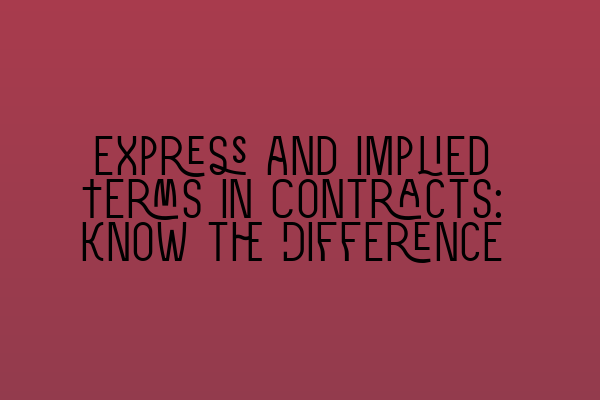Welcome to another informative blog post by SQE Contract Law! Today, we will be discussing an important concept in contract law – the difference between express and implied terms in contracts. Understanding this distinction is essential for both individuals and businesses engaged in legal agreements. So, without further ado, let’s dive right in!
The Basics: What Are Express and Implied Terms?
Before we delve into the differences, let’s define express and implied terms in contracts.
Express terms are those that are explicitly stated and agreed upon by the parties involved. These terms can be in written or verbal form, and their inclusion in the contract is crucial for establishing the rights and obligations of each party.
Implied terms, on the other hand, are not explicitly stated in the contract, but are read into it by operation of law or through common understanding between the parties. Implied terms fill in the gaps, ensuring that the contract is fair and reasonable for both parties.
Now that we have a basic understanding of express and implied terms, let’s explore their differences in greater detail.
The Differences Between Express and Implied Terms
1. Formation
Express terms are consciously and intentionally included by the parties during contract negotiations or through written agreements. They are specifically agreed upon and documented to form part of the contract.
Implied terms, on the other hand, are not explicitly discussed or written down during negotiations. They are implied by law or inherent in the nature of the transaction based on the reasonable expectations of the parties involved.
Click here to learn more about LLC formation.
2. Certainty
Express terms provide a higher level of certainty as they are clearly stated and agreed upon by the parties. This clarity ensures that there is no ambiguity or confusion about the rights and obligations of each party.
Implied terms, on the other hand, may introduce a certain degree of uncertainty as they are not explicitly defined. However, they are necessary to fill in gaps and address common expectations that may arise during the course of the contract.
3. Flexibility
Express terms allow for greater flexibility and customization. The parties have the freedom to negotiate and specify the terms and conditions that best meet their individual needs and requirements.
Implied terms, on the other hand, are less flexible and cannot be easily modified or excluded. They are based on legal principles or common practices and are generally applicable to similar types of contracts.
Are you interested in learning more about Delaware corporate law? Click here.
4. Awareness
Express terms are explicitly communicated and agreed upon, ensuring that both parties are aware of their existence and content. This awareness is crucial for enforcing rights and obligations and resolving any disputes that may arise.
Implied terms, on the other hand, may not always be explicitly discussed or acknowledged by the parties. However, they are deemed to be incorporated into the contract based on legal presumptions or the reasonable expectations of the parties.
When to Seek Legal Advice
Now that you understand the difference between express and implied terms, you may be wondering when it’s necessary to seek legal advice. It’s always recommended to consult a solicitor when:
- You need help interpreting complex contract terms.
- You encounter a dispute regarding the inclusion or interpretation of certain terms.
- You want to ensure that your rights and obligations are adequately protected.
By seeking professional legal advice, you can navigate the intricacies of contract law and make informed decisions that are in your best interest.
For more expert insights and articles, check out our related content:
- Complying with Legal Obligations: Delaware LLCs in the UK
- The SQE for International Lawyers: A Bridge to British Legal Practice
- Expert Insights: Solicitors in UK Courts – Tips and Strategies for Success
We hope you found this article helpful in understanding the difference between express and implied terms in contracts. Remember, clarity is key when it comes to contract negotiations and enforcement. Stay informed, consult a solicitor when needed, and protect your rights!
